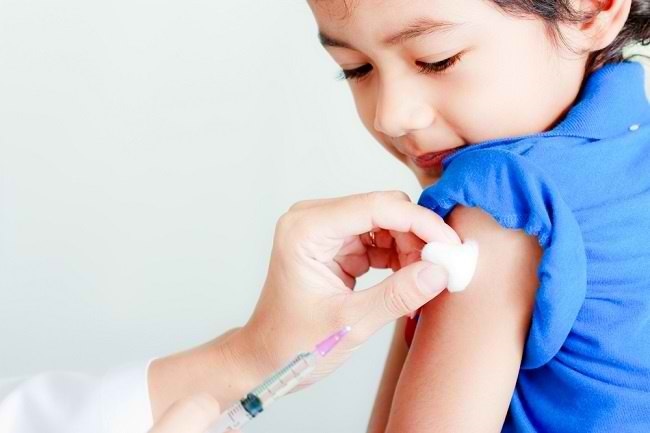List of compulsory immunizations that must be obtained by the child
Mandatory immunizations are immunizations that must be obtained by children before the age of 1 year. In Indonesia, there are 5 types of immunizations that must be given to children. Each type of immunization needs to be given according to its own schedule to provide a maximum protective effect against disease.
Immunization is the process of giving vaccines to a person's body to provide immunity against dangerous diseases that can cause disabilities or even death.

Compulsory immunization has been proven to be safe and beneficial to prevent transmission of the disease to children while preventing it from transmitting the disease to other children.
Although infected with an infection, children who have been immunized will also usually show milder symptoms compared to children who are not immunized.
5 Types Mandatory Immunization and Delivery Schedule
Based on the Regulation of the Minister of Health of the Republic of Indonesia No.42 of 2013 and No.12 of 2017 concerning the implementation of immunization, it is stated that there are 5 types of mandatory immunizations that must be obtained by the Child.
These five types of mandatory immunization are given according to the age of the child and the schedule set by the government, and of course based on the doctor's consideration. The five types of immunizations are:
1. Hepatitis B immunization
Hepatitis B immunization aims to prevent hepatitis B, which is a liver infection that can cause dangerous complications, such as cirrhosis and liver cancer. The type of vaccine used is the hepatitis B vaccine.
The vaccine is given to infants 4 times. The first gift is given immediately after the baby is born or no later than 12 hours after birth. Then, the vaccine is given again consecutively at the age of 2, 3, and 4 months.
If the baby is born to a mother who is infected with hepatitis B, then giving hepatitis B immunization to the baby must be given no later than 12 hours after birth. The baby also needs to get an injection of hepatitis B immunoglobulin (HBIG) to produce immunity against the hepatitis B virus in a short time.
2. Polio immunization
Polio is an infectious disease caused by a viral infection that attacks the nervous system in the brain and spinal cord. In severe cases, polio can cause shortness of breath, meningitis, paralysis, and even death. Well, the polio immunization aims to prevent children from contracting the disease.
In Indonesia, the type of polio vaccine commonly used is the polio vaccine (oral) drops, but there are also polio vaccines available in the form of injections.
Polio drip vaccine is given 4 times, which is when a new baby is born or at the latest at the age of 1 month. Furthermore, the vaccine is given consecutively at the age of 2 months, 3 months, and 4 months. Meanwhile, injectable polio vaccine is given once, at the age of 4 months.
3. BCG Immunization
This immunization aims to protect the body from germs that cause tuberculosis or TB. TB is a dangerous infectious disease that can attack the respiratory tract, bones, muscles, skin, lymph nodes, brain, gastrointestinal tract, and kidneys.
BCG immunization is included in the list of mandatory immunizations in Indonesia, because Indonesia still has high TB cases. BCG immunization is only done once and given to babies at the age of 2 or 3 months. BCG immunization is given by injection into the baby's skin.
4. Measles immunization
Measles immunization is given as a preventative measure against severe measles that can cause pneumonia, diarrhea, and inflammation of the brain (encephalitis). Measles immunization is given 3 times, namely when the child is 9 months, 18 months, and 6 years.
If the child is given the MR/ MMR vaccine at the age of 15 months, then re-measles immunization at 18 months does not is required. This is because the MR or MMR vaccine already contains the measles vaccine.
5. DPT-HB-HiB immunization
DPT-HB-HiB immunization can provide protection and prevention against 6 diseases at once, namely diphtheria, pertussis (whooping cough), tetanus, hepatitis B, pneumonia, and meningitis (inflammation of the brain).
This mandatory immunization is given 4 times with a schedule of successive administration to infants at the age of 2 months, 3 months, 4 months, and the last dose of administration when the child is 18 months of age.
Additional Immunizations Needed to be Given to Children
In addition to the five mandatory immunizations above, the Indonesian Pediatrician Association (IDAI) also recommends that parents get their children to be immunized. additional, namely:
- MR/ MMR vaccine, to prevent measles, rubella and mumps.
- Pneumococcal vaccine (PCV), to prevent pneumococcal germs that cause pneumonia , ear inflammation, and meningitis.
- Rotavirus vaccine, to protect children from gastroenteritis that causes diarrhea.
- Vaccines hepatitis A and typhoid, to reduce the risk of hepatitis A and typhoid fever in children.
- Varicella vaccine, to prevent varicella-zoster virus infection that causes chickenpox.
- Influenza vaccine, for provide protection against ARI due to flu.
- HPV (Human Papillomavirus) vaccine, as a prevention against cervical cancer.
- Japanese encephalitis (JE) vaccine, to prevent Japanese encephalitis virus infection that causes inflammation of the brain disease.
To get mandatory immunization, you can take your child to the health service center, such as posyandu, puskesmas, practice doctors and hospitals.
Compulsory immunization can be given free of charge or at a very cheap price because it has been budgeted by the government. Whereas additional immunization can be obtained by issuing costs according to the price of the vaccine and doctor's service rates.
In order to achieve optimal protective effects, all types of immunizations, both mandatory and additional immunizations, must be obtained by the baby according to the recommended schedule. However, if the child falls ill when the immunization schedule arrives, then immunization can be postponed until the child is cured.
Label : Uncategorized
Comments
Post a Comment